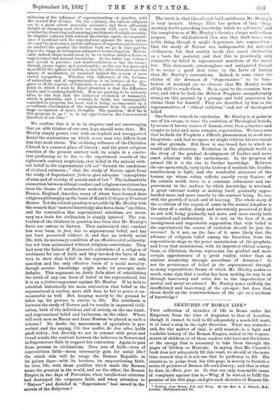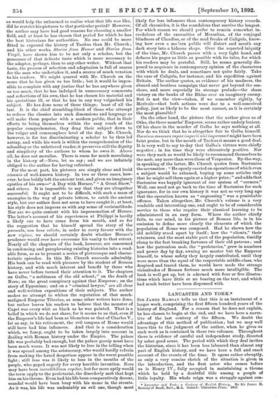SKETCHES OF ROMAN LIFE.* Tins collection of sketches of life
in Rome under the Emperors, from the time of Augustus to that of Aurelius, though it cannot be said to fill adequately a much-felt want, is at least a step in the right direction. What was wanted— and, for the matter of that, is still wanted—is a light and readable history of the Roman Empire, suited to the require. mente of children, or of those readers who have not the leisure or the energy that is necessary to take them through the pages of Gibbon or Merivale. In saying that Mr. Church's book does not adequately fill this want, we should at the same time remark that it is not one that he professes to fill. His intention, to judge from his title-page, is merely to furnish a series of pictures of Roman life and history ; and that is what. he does, in effect, give us. So that our only reasonable cause of complaint against him is,—Why, if he wished to fulfil the promise of his title-page, and give such sketches of Roman life
• Pictures from Boman Life and Story. By the Rey. A. J. Church, ILA. London: link-Wawa and Co.
as would help the unlearned to realise what that life was like, did he restrict his pictures to that particular period? However, the author may have had good reasons for choosing a smaller field, and at least he has chosen that period for which be has the best historians for authorities. No one could be more fitted to expound the history of Tacitus than Mr. Church ; and his other works, Stories from Homer and Stories from Virgil, have shown him to be not only a scholar, but the possessor of that delicate taste which is more necessary to the adaptor, perhaps, than to any other writer. Without that taste, the process of selection and adaptation is full of snares for the man who undertakes it, and a source of much vexation to his readers. We might quarrel with Mr. Church on the score that he has given us too little ; but it would be impos- sible to complain with any justice that he has anywhere given us too much, that he has indulged in unnecessary comments and reflections of his own, that be has chosen his material and his quotations ill, or that he has in any way vulgarised his subject. He has done none of these things ; least of all the last. It is the chief stumbling-block of those who attempt to reduce the classics into such dimensions and language as will make them popular with a modern public, that in their efforts to bring themselves within the easy reach of the popular comprehension, they drag their subject down to the vulgar and commonplace level of the day. Mr. Church, however, is far too discriminating a scholar to be thus led astray, and while his work is within the comprehension of the schoolboy or the unlettered reader, it preserves still the dignity and simplicity of the authors to whom he owes it. Above all, he does not moralise. There is room for much moralising in the history of—Nero, let us say ; and we are infinitely obliged to the author for having refrained.
For the most part, his pictures are simply clear and lucid resumes of well-known history. In two or three cases, how- ever, he has boldly left the ancient text, and given us imaginary epistles of his own—" A Day with Horace," " A Great Show," and others. It is impossible to say that they are altogether successful. It ought not to be difficult, with such a mass of examples in the way of private letters, to catch the ancient style, but our author does not seem to have caught it; at least, his style does not impress us with any sense of verisimilitude. Nor are we quite content with his impersonation of Horace. The latter's account of his experiences at Philippi is hardly a likely one to have come from his mouth, and as for the suggestion that he himself spread the story of the parmula, non bene relicta, in order to curry favour with the new regime, we should certainly doubt whether Horace's prudence would ever have overcome his vanity to that extent. Nearly all the chapters of the book, however, are concerned in condensing and paraphrasing existing histories into a read- able form, so as to present a series of picturesque and charac- teristic episodes. In this Mr. Church succeeds admirably. His book can be read with pleasure by the student of Roman history, and with much interest and benefit by those who have never before turned their attention to it. The chapters on Galba, "a nobleman of the old school ; " on the death of Nero; on the great conspiracy against that Emperor; on the story of Epponima; and on a " criminal lawyer," are all clear and well-written expositions of their subjects. The author snakes no attempt to whiten the reputation of that much- maligned Emperor Tiberius, as some other writers have done, but rather leaves his readers to believe that the monster of Capri was every whit as black as he was painted. That is a belief in which we do not share, for it seems to us that, even if the Emperor's life had been as blameless as that of Charles V., let us say, in his retirement, the evil tongues of Rome would still have had him infamous. And that is a consideration which, we fancy, ought to be taken largely into account in dealing with Roman history under the Empire. The palace life was probably bad enough, but the palace gossip must have been much worse. It was not likely to lose in the telling when it was spread among the aristocracy, who would hardly refrain from making the hated despotism appear in the worst possible light ; still less was it likely to lose in the mouths of the people, who gaped eagerly for every horrible invention. Nero may have been incredibilium cupitor, but far more aptly would the term apply to the proletariat, the disorderly mob that kept him on his throne. Even had his life been comparatively decent, scandal would have been busy with his name in the streets. As it was, his life was undeniably an evil one, though most likely far less infamous than contemporary history records. Of all chronicles, it is the scandalous that survive the longest. For which reason we should prefer to remain somewhat in- credulous of the enormities of Messalina, of the conjugal blindness of Claudius, or of the mad freaks of Caligula, know- ing how even a mo lern public will distort and mouth any dark story into a hideous shape. Over the reported iniquity of the time, Mr. Church passes with a very light hand, and defaces his pages as little as possible with its tales, for which his readers may be grateful. Still, he seems generally dis- posed to acquiesce in contemporary opinion of the characters with which he deals, and sometimes not quite fairly. Take the case of Caligula, for instance, and his expedition against Britain. The author quotes, as evidence of his madness, the absurd and bootless campaign that never got beyond the sea- shore, and more especially its strange prelude—the sham victory on the banks of the Rhine over an imaginary enemy. But is not the view—taken, if we remember rightly, by Merivale—that both actions were due to a well-conceived policy, just as likely to be the most correct, as it is certainly the most plausible ?
On the other hand, the picture that the author gives us of Otho, the three months' Emperor, seems rather unduly lenient. Of his share in the murder of Galba he says nothing at all. Nor do we think that he is altogether fair to Galba himself. Omnium consensu capax imperii nisi imperasset might have been faint praise, but in the mouth of Tacitus it means a good deal. It is very well to say to-day that Galba's virtues were chiefly negative ; in his time they were obtrusively positive. Nor were they such as would be likely to recommend themselves to the mob, any more than were those of Vespasian. By-the-way, in speaking of the latter, Mr. Church quotes from Suetonius the accusation : " He openly carried on operations of which even a subject would be ashamed, buying up some articles only that he might sell them again at a higher price ; " and adds that Suetonius was happily ignorant of our system of "corners." Well, one need not go back to the time of Suetonins for such ignorance, for in our own history it was not so very long ago that the operation known as " engrossing " was a punishable offence. Taken altogether, Mr. Church's volume is a very readable and interesting one, and ought to be of considerable service to those who require their classical learning to be administered in an easy form. Where the author chiefly fails, to our mind, in his picture of Roman life, is in his omission to define more clearly the elements of which the population of Rome was composed. Had he shown how the old nobility stood apart by itself ; how the " clients," their retainers, and the most stable part of the population, timidly clung to the fast breaking fortunes of their old patrons ; and how the patronless mob, the " proletaries," grew in numbers and power day by day, owning no master but the Emperor himself, to whose safety they largely contributed, until they were more than the equal of the respectable middle-class, who despised and feared them, he would have made the strange vicissitudes of Roman fortune much more intelligible. The book is well got up, but is adorned with four or five illustra- tions which have little or no bearing on the text, and which had much better have been dispensed with.



































 Previous page
Previous page